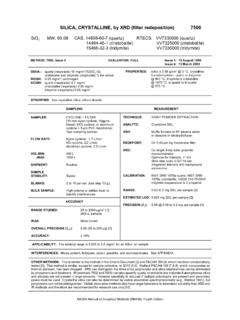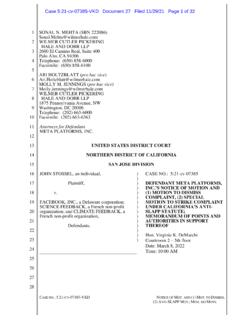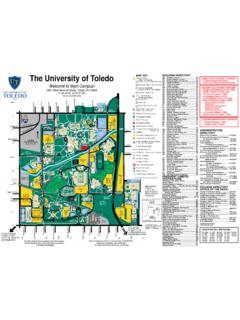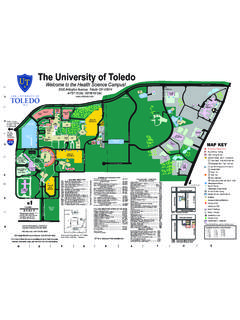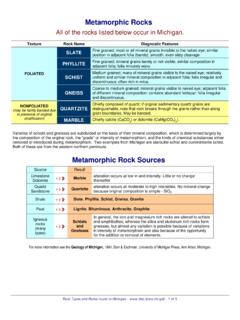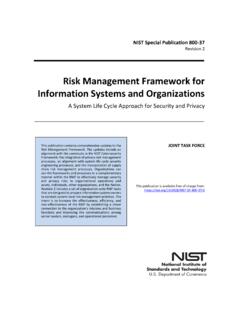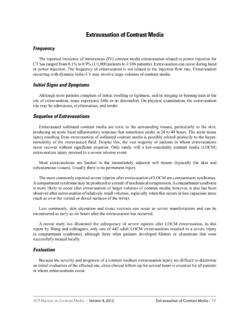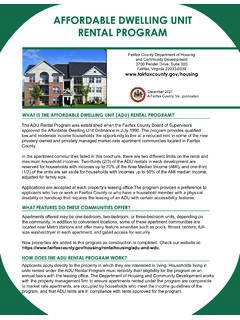Transcription of Voting Rights Timeline 1605 - - 1971 - News21
1 Voting Rights Timeline1605 - - 1971 - 1605 - COLONIAL ERA Resources:1607 - English Colony EstablishedFirst permanent English colony in North America founded at Jamestown, :1676 - Right to vote Reserved for PropertyOwners The Bacon Rebellion occurred in 1676 when white men, indentured servants and some Africans burned the Virginia colonial capital toforce the government to crack down on Native Americans. As a result, property requirements for Voting were restored in Virginia andpermanent slavery for Africans was :1676 - Virginia Further Restricts Rights of FreeBlacks and SlavesFollowing the Bacon Rebellion, Virginia became the first state to establish Black Codes, which did away with indentured servitude andreplaced it with permanent slavery for Africans.
2 By the early 1700s each colony had enacted laws that not only regulated conditionsfor black slaves but also restricted the Rights of free blacks. Black slaves and free blacks alike could not vote , testify in court against awhite person, or marry a white person. Slaves were not allowed to carry arms or leave their homes without written permission. Resources:COlonial Authority ( )1718 - Maryland Bars Catholics from VotingAfter nearly 70 years of religious tolerance called for in the Maryland Toleration Act, the colonial government barred Catholics :1732 - Colonies Allow Only Taxpayers andProperty Owners to VoteEach of the 13 colonies allowed only landowners or men who owned a substantial amount of personal property or paid taxes to :1737 - New York Bars Jews from VotingThe General Assembly of New York barred Jews from Voting , one of four colonies to do so.
3 Five colonies at the time barred Catholicsfrom :1756 - First Woman Legally Votes in Colonies Lydia Taft became the first woman to legally vote in the American Colonies, Voting in a town meeting in Uxbridge, Mass., following theuntimely death of her husband. The vote was on whether the town should support the French and Indian War :1757 - REVOLUTIONARY WAR ERA Resources:1770 - Slave who could not vote is FirstColonist to Die for AmericanIndependence Crispus Attucks, a slave without the right to vote , became the first colonial soldier to die for American independence when he waskilled by the British in the Boston : Timeline ( )1773 - Boston Tea Party Protests Lack ofRepresentation in ParliamentTax-paying Massachusetts colonists protested their lack of representation in British Parliament by destroying a shipment of tea inBoston Harbor.
4 It was one of the many protests that eventually led to independence and war with :1776 - Catholics, Jews, Quakers Barred fromVotingAlthough a Catholic signed the Declaration of Independence, Catholics, Jews, Quakers and others are barred from Voting , thoughother white men with property could vote . Resources:1776 - Some States Allow Free Blacks to VoteFree blacks could vote in New Jersey, Pennsylvania and Connecticut. Resources:1776 - Abigail Adams Entreats Husband toRemember the LadiesDuring the second Continental Congress, Abigail Adams entreated her husband, John Adams, to "remember the ladies" in the newcode of laws he was :A History of American Suffragist Movement ( )1776 - Voter Eligibility Depends on PayingTaxes1776-1778: Many states replaced property requirements with tax-paying requirements for Voting eligibility.
5 Some states allowedanyone who had served in the military to vote . Resources:The Right To vote ( #v=onepage&q&f=false)1777 - Vermont Grants Universal Male SuffrageVermont ratified its Constitution, which prohibited slavery and indentured servitude and provided universal male suffrage with noproperty requirementsResources:1777 - Women Lose Right to vote in New York Women with property whose husbands had died were allowed by many New York counties to vote until the state moved to ban :1780 - Massachusetts Moves to Stop Womenfrom Voting The state stepped in to preclude women with property or money from :1781 - Samuel Adams Describes Voting as aSolemn TrustSamuel Adams wrote.
6 "Let each citizen remember at the moment he is offering his vote that he is not making a present or acompliment to please an individual or at least that he ought not so to do but that he is executing one of the most solemn trusts inhuman society for which he is accountable to God and his country."Resources:Samuel Adams ( )1783 - Slaves Counted as Three-Fifths inNorth-South Compromise The most controversial of all compromises between the North and South, proposed in 1783, was the Three-Fifths Compromise, anagreement to count three-fifths of a state's slaves in apportioning representatives, presidential electors and direct taxes. Although itwas at a rate less than whites, African-American slaves who were not allowed to vote were being factored into the equation fordetermining the number of representatives.
7 Resources:1784 - Female Voting Further Restricted in NewHampshire The state moved to ensure that no women - not even those with property - were allowed to :1787 - New Jersey Sole State Still AllowingSome Women to VoteBy 1787, women in all states except New Jersey had lost the right to vote . Since the birth of the nation, women in New Jersey couldvote as long as they had at least 50 British pounds in cash or property. Resources:The Right To vote ( #v=onepage&q&f=false)1788 - More Men Living on Frontier vote thanCity Counterparts In frontier areas, 70 percent to 80 percent of white men were able to vote ; in the cities, that number dropped to less than 50 percent.
8 Resources:1788 - Federal Government Leaves VotingDecisions to States The federal government left it up to states to determine Voting :1790 - Property Requirement for VotingDisappearsNone of the new states being admitted to the Union required people to own property in order to :1790 - Free Blacks Allowed to vote in SixStatesBy this time, six states (Maryland, Massachusetts, New York, North Carolina, Pennsylvania and Vermont) permitted freeAfrican-Americans to vote . Resources:Winning the vote ( )1790 - First Naturalization Act PassesThe first Naturalization Act only permitted free white persons to become American citizens. Asians and other ethnic groups wereexcluded, and therefore could not :1790 - Sephardic Jews Seek Political EqualityWhile denied the vote or ability to hold office in some areas, Sephardic Jews became active in community affairs in the 1790s, afterachieving political equality in the five states where they were most :Ethnicity, Race, and American Foreign Policy ( ) ( #v=onepage&q&f=false)1792 - Delaware Drops Property TaxRequirement Delaware eliminated its property requirement for.
9 1792 - White Male Suffrage ExpandsThe constitutions of Connecticut, Delaware, Kentucky, Maryland, New Jersey, North Carolina, Tennessee and Virginia, excludedblacks from Voting , but expanded white male suffrage. Resources: Voting Rights in America ( )1800 - Only Citizens Can vote in New StatesAlmost all the states that joined the union between 1800 and 1840 conferred the right to vote exclusively to citizens. Resources:1802 - Maryland Drops Property Requirement Maryland eliminated its property requirement for :1805 - ANTEBELLUM Resources:1807 - New Jersey Restricts Voting to Free,White MalesOne of the earliest acts of suffrage restriction was New Jersey's disenfranchisement of women in 1807.
10 After an election to determinethe site of a new courthouse in Essex County, New Jersey's legislature declared that "no person shall vote in any state or countyelection for officers in the government of the United States or of this state, unless such person be a free, white male citizen. Resources:1814 - Connecticut Defines Freeman as WhiteUntil 1814 in Connecticut, a black landowner could vote , but the state legislature ruled that year that the term "freeman" meant freewhite man, excluding free black men, such as businessman William Lanson, from Voting . Four years later, this exclusion was madepart of the state's constitution. Resources:The Attack on Black Citizenship in Connecticut ( )1819 - Maine Restricts Indian VotingThe Maine legislature decided that Native Americans who did not pay taxes would not be allowed to :1821 - Property Tax Requirement Applies Onlyto Black MenMassachusetts and New York eliminated their property requirement for white men to vote , but black men in New York still had to ownproperty to vote .
